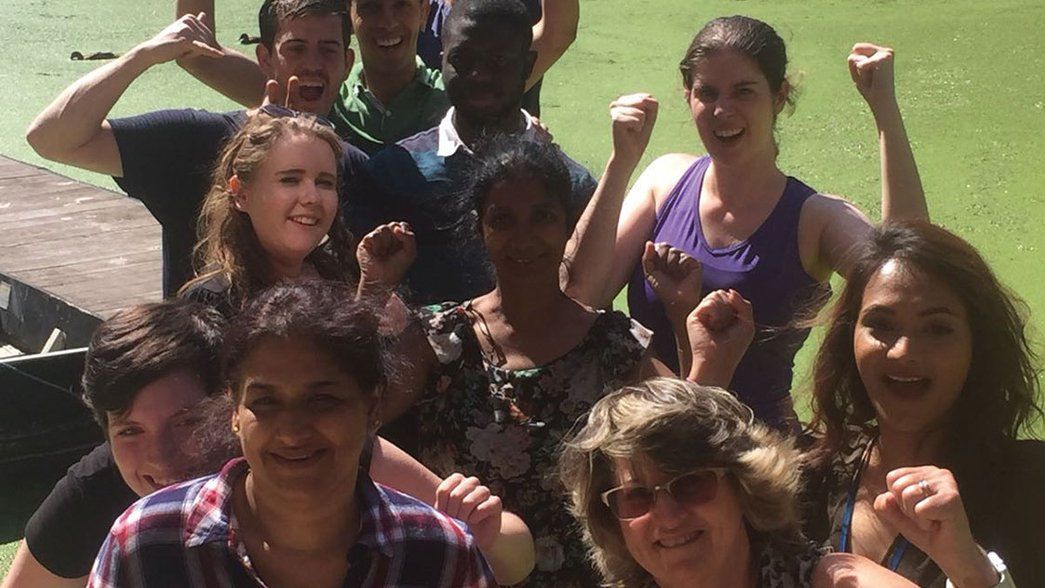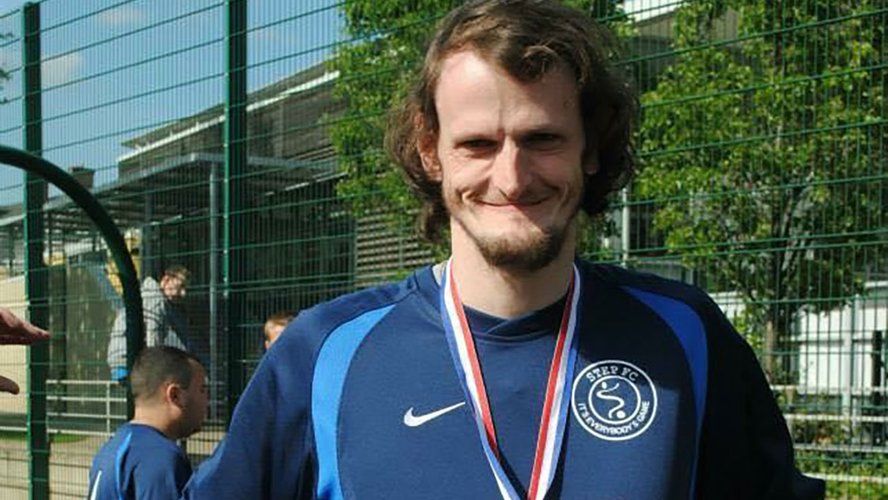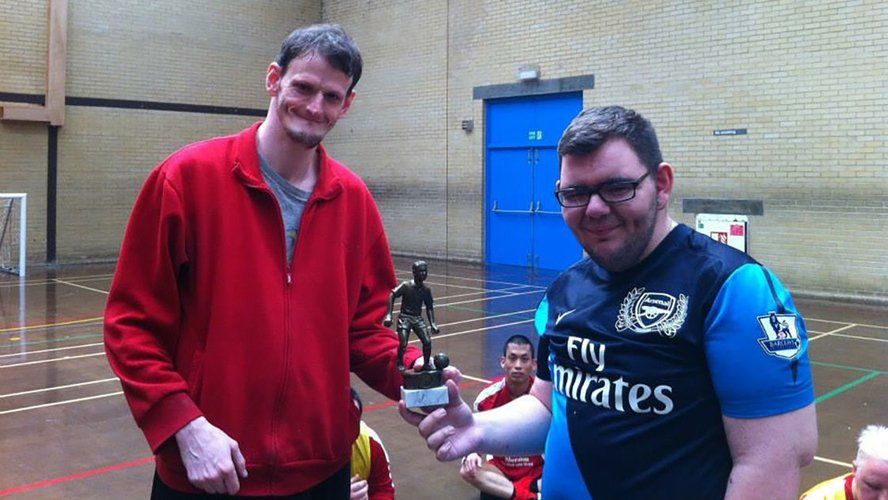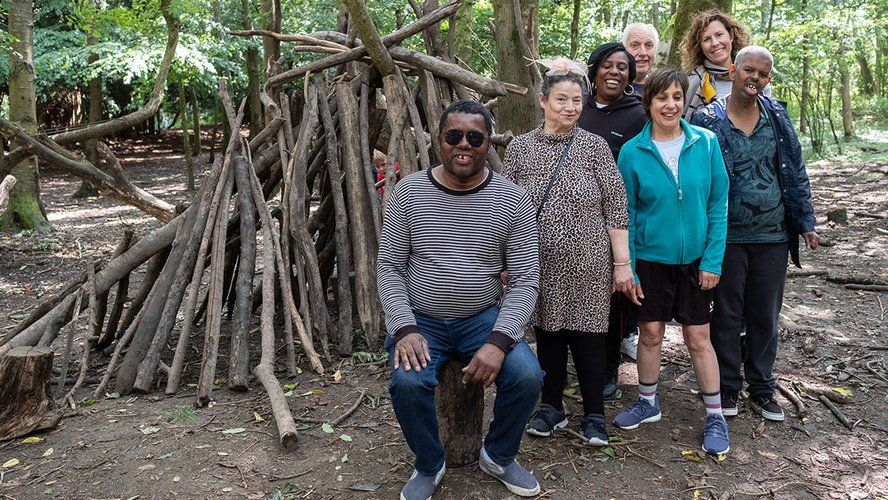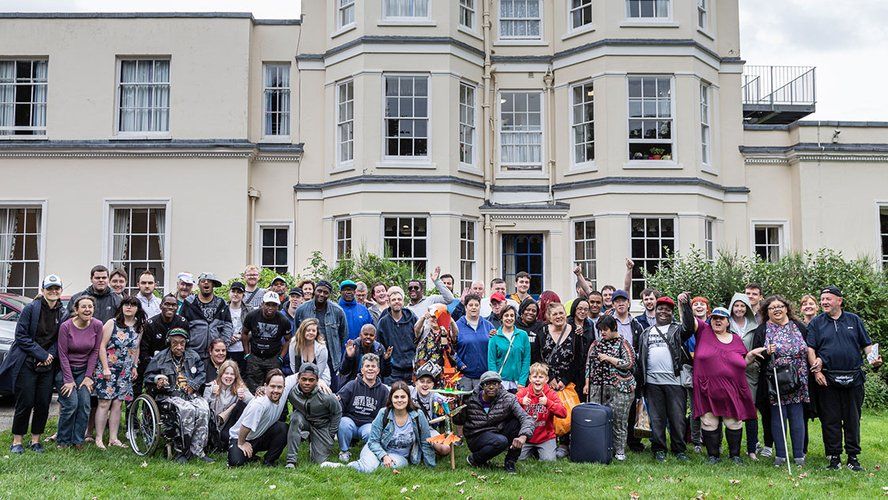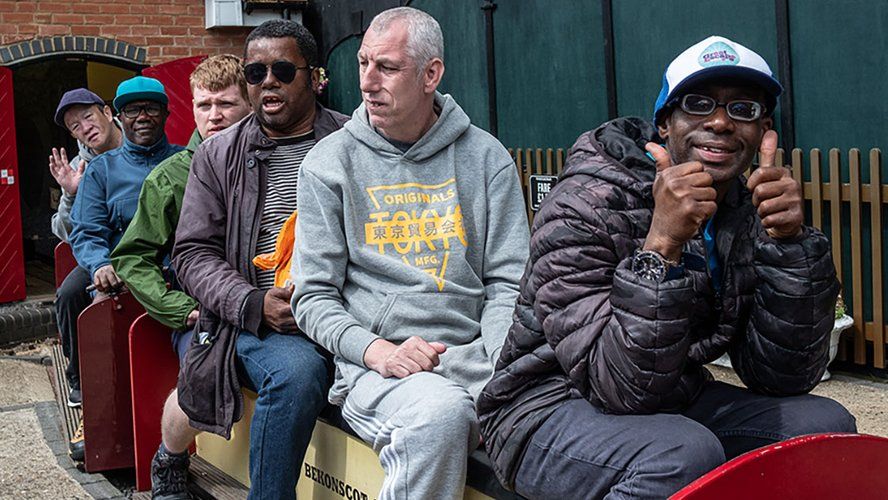Arsenal fund a wide range of organisations through The Arsenal Foundation, and among those are charities that support people of all ages with additional needs to help improve their quality of life.
It’s impossible to cover the full breadth of the work done by the organisations we support in one installment, but in this instance we hear from and on behalf of just a few of the local people whose lives have been enriched by dedicated charities that truly care about their wellbeing.
STEP Football is a local team for adults with learning disabilities. Patrick Murphy is a long-standing regular who now does more than just play football…
“I was born and raised in Islington and I’ve been going to STEP Football almost since it started in January 2004. I heard about it from a teacher of mine at college, and I’ve always loved watching and playing football so I thought I’d give it a go. I also thought it would help me meet people and get fitter.
“I play up front for the first team and at more than six foot I’m one of the taller members of the team, so I’d like to think I’m good in the air. I’m always working on my game in the hope of scoring more goals. But I’ve also gone beyond just playing, because not long ago I got my Level 1 football coaching qualification, which means I now also coach our ‘fun league’ players. I really enjoy that side of it – I get the players warmed up, then take the coaching sessions before we finish with a match. We work on different things like ball control, passing and shooting, and I always try to make sure that every player is really taking part and having fun. It also helps me help the players to work as a team, which is really important.
“I have got so much out of STEP over the years and the coaches have always been great with me, especially the club’s founder, Tony Reid, who set it up from scratch on his own. STEP has given me so much more confidence. I’ve learned to work with other people and made a lot of friends along the way, too.
“The money from the Arsenal Foundation has been brilliant because it has helped us to keep going – we were stone broke at one point and the donation made sure we stayed alive. We were worried about how we were going to keep going, and we’ve held fundraising events since then, but we wouldn’t have made it that far without the money from The Arsenal Foundation to pay for the sessions.
“I’m a massive Gooner so that makes the help we have received even more special to me – and I haven’t given up hope of making the Arsenal first team just yet!”
Remark UK! is an organisation that offers British Sign Language training and supports deaf people to live independently. Katie Matthews, from Surrey, tell us about the charity’s Remarkable! Club
“I don’t have day-to-day problems being deaf but I do wish people would know how to communicate with deaf people. I’ve even faced discrimination at work because of it.
“I came into contact with the Remark! Community when I was feeling depressed after going through a break-up. I didn’t know what to do and I honestly thought I should just give up. A friend suggested I join the Remarkable! Club, where deaf people meet every week, and although I felt like I couldn’t be bothered it was a good thing that I went. My first memory was a trip to The Maritime Museum in Greenwich – I was so shy and quiet.
“The second time I went was very emotional. I cried, in what turned out to be a good way. It was a workshop about Positive Relationships and Positive Mindset, and it was going well until we started talking about negative impacts. I tried to keep my tears back as it reminded me of the break-up, but I just sobbed.
“Then I saw a lovely woman with bright red hair. Annie came to ask if I was alright and if I’d like some space to calm down and talk in a private room. I was so grateful that I was able to express my feelings – throughout my teens I had nobody to talk to so I bottled up my emotions. I’m so glad I found the club because I’ve made lots of friends and I have really embraced my deaf identity.
“We meet every Tuesday in London to socialise. We do indoor activities – board games, arts and crafts – and go to museums and funfairs, play ball sports and do things like kayaking and cycling. We also have workshops, including Positives and Negatives, Sexting Advice, Food Safety and lots more.
“I also volunteered for the Remark! Playscheme for a year and then became a Playworker. I’ve achieved a lot since I joined Remark!
“I think back and I was heartbroken when my first boyfriend broke up with me. I felt like I wanted to give up. I didn’t want to go out. But I joined Remark! and everything changed. I enjoy it so much.”

Metro Blind Sport is a charity that helps people with impaired vision. Tennis player Joanna Turnbull, from Surrey, reveals how taking up sport has changed her life…
“I was born with bilateral congenital cataracts in both eyes, even though there was no history of it in the family. As a baby I had corrective surgery, which restored some vision, but the techniques of the day resulted in damage to lens of the eyes and I have always been partially sighted.
“I was introduced to Metro Blind Sport by my husband, who is also visually impaired and had recently started playing cricket with the club. He said he was going to try the soundbell tennis during the winter months and suggested I try it. I must admit I wasn’t keen on the idea as I hadn’t really had much to do with the world of sight impairment since leaving the partially sighted school system in 1984.
“Although I went to the gym regularly and went swimming I’d never picked up a tennis racket in my life as it seemed pointless not being able to see the ball coming, let alone having any chance of returning it. But I thought I’d give it a go and was amazed to find that I actually managed to hit the specially adapted ball and occasionally get it over the net.
“I was shown how to serve and hold the racket correctly by the coach and also helped by the volunteers from Highgate Tennis Club. As a vision-impaired person it’s not always possible to copy actions. I’ve not only had to learn the game but learn how to play the game in a way that works for me. Some of the Metro member are LTA-qualified coaches and I’ve found their input invaluable. I’ve made several friends at the sessions, and of course there is always time for a swift half down the local pub after all that running round chasing the ball.
“Metro Blind Sport has allowed me to participate and improve in a sport I would have never considered accessible to me. It’s become part of my weekly routine as much as going to work or to the gym.”

Being partially sighted didn't stop Joanne (right) from taking up tennis
The Camden Society’s Great Escape programme offers week-long residential activity breaks to adults with learning disabilities. Fundraising manager Deborah Turton tells us about it.
“One recent Great Escape took a total of 57 adults with a variety of learning disabilities to Woodrow High House, a residential activity centre in Buckinghamshire. The emphasis for the week was on getting everyone active, with a lot of time outdoors.
“The trip provided a fun and stimulating programme including a wide range of physical activities: sports (swimming, football, archery, rounders and an obstacle course) and outdoor pursuits (orienteering and team adventure games including woodland den making and fire building), plus trips to local tourist attractions Bekonscot Model Village and Odds Farm Park.
“There were also opportunities for creative pursuits including music making, painting and photography, on top of time for relaxing and socialising.
“We know from feedback that our Great Escape events really help to enhance people’s health and wellbeing, and this trip definitely achieved that. The attendees loved trying new activities and these really helped to build their confidence. The social aspect was also really important because for many attendees this was the only time they had really had to get together with groups of friends and share extended leisure time.
“All attendees had learning disabilities and many had additional needs. These included a wheelchair user with severely limited mobility, one individual who had recently lost a parent and at least two attendees with very limited financial resources, all of whom desperately needed a holiday and were able to attend solely due to the generous support of funders such as The Arsenal Foundation. In these cases we were able to fully meet the cost and enable them to join us.
“We’re now working to support many attendees to continue the exercise activities they sampled. A number of people were keen to establish one or more sports clubs and we’re in the process of setting up our own football club.
“The Arsenal Foundation’s funding was vital to enabling us to deliver our residential break for people. Beyond that, our wider ongoing relationship with the Foundation and the club – including support for our employment services – means many service users are now much more aware of Arsenal and have a greater sense of being part of the local community. They’re aware of the Foundation’s support for the Great Escape and it means a lot to them.”
A grant from The Arsenal Foundation helped fund ALAG, the Asperger London Area Group. Local ALAG member Thomas Marston reveals how the group has helped him
“From early childhood I faced many daily challenges due to a range of health conditions including multi-focal epilepsy, speech disability and autism. Despite my difficulties – and with a lot of support from my parents – I managed to navigate my way through the education system and achieve a BA Hons in Human Geography with Humanities Information Technology at North London University, right next to the Arsenal ground.
“Throughout school and university I had to work harder and for longer than the other students to finally gain my degree. But even with my qualifications I struggled to find employment. I continued to face rejection due to a lack of understanding of my disability, which was widespread. My speech difficulties meant it was hard to articulate my thoughts and feelings. I felt lonely and isolated with no friends and no social life. Social isolation is a common experience in the autism community due to the difficulties people on the spectrum experience with social communication.
“I came into contact with ALAG around six years ago now. I heard they run support groups in Islington and offer advocacy services to people on the spectrum. I was interested to find out if they could help me get the support I really needed to find a job and to make friends.
“Initially I was reluctant to attend the meetings after having had many bad experiences, but once I started going I felt welcomed and valued. I enjoy the support meetings where members get a chance to share experiences and discuss autism. The topics are practical and helpful, especially when dealing with employment and relationships – two areas I’ve always had a lot of difficulty with. I’ve also enjoyed attending other events organised by ALAG, including autism-friendly outings that help to provide opportunities to improve my social skills.
“ALAG has also provided emotional support by helping me understand my condition better and to feel accepted and valued for who I am. I feel more confident to go out and do the things I enjoy doing and I’m less isolated now.
“I think it’s great that football clubs support local charities like ALAG to provide much-needed services often with very little funding. A big thank you to Arsenal!”

Thomas overcame social isolation and received emotional support to help him deal wtih his autism at ALAG
Copyright 2025 The Arsenal Football Club Limited. Permission to use quotations from this article is granted subject to appropriate credit being given to www.arsenal.com as the source.




